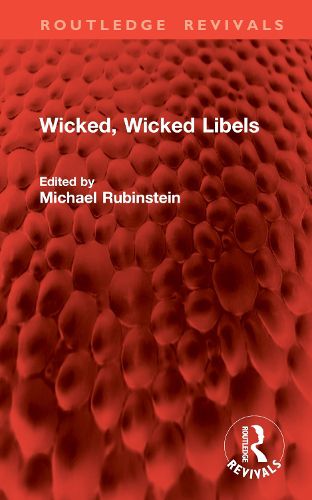Readings Newsletter
Become a Readings Member to make your shopping experience even easier.
Sign in or sign up for free!
You’re not far away from qualifying for FREE standard shipping within Australia
You’ve qualified for FREE standard shipping within Australia
The cart is loading…






'The law of libel is the instrument of censorship by which dignity-too often pseudo-dignity-is to be upheld.' That is Michael Rubinstein's definition in his introduction to this lively and authoritative account Wicked, Wicked Libels (originally published in 1972) of the libel situation in Britain.
The contributors are all actively concerned about libel as a living issue. Michael Rubinstein writes first about 'the popular appetite for scandal', and the other contributors view libel from various angles. H. Montgomery Hyde looks at the law of libel itself, Louis Blom-Cooper writes about the conflicts between freer speech and privacy, and Anthony Lincoln discusses the problems facing legal advisers to the press. William Kimber, Richard Ingrams and Cecil H. King look at the subject from the publisher's point of view. Eugene Gros writes as a successful plaintiff, Louis A. Abraham looks at defamation as contempt of Parliament, and Michael Rubinstein contributes a chapter on book publishing and the law of libel. There are also two important appendices of particular interest: one an account by Harold Laski of a day in court, and the other a Press comment on the PQ 17 case after the hearing in the Court of Appeal.
$9.00 standard shipping within Australia
FREE standard shipping within Australia for orders over $100.00
Express & International shipping calculated at checkout
'The law of libel is the instrument of censorship by which dignity-too often pseudo-dignity-is to be upheld.' That is Michael Rubinstein's definition in his introduction to this lively and authoritative account Wicked, Wicked Libels (originally published in 1972) of the libel situation in Britain.
The contributors are all actively concerned about libel as a living issue. Michael Rubinstein writes first about 'the popular appetite for scandal', and the other contributors view libel from various angles. H. Montgomery Hyde looks at the law of libel itself, Louis Blom-Cooper writes about the conflicts between freer speech and privacy, and Anthony Lincoln discusses the problems facing legal advisers to the press. William Kimber, Richard Ingrams and Cecil H. King look at the subject from the publisher's point of view. Eugene Gros writes as a successful plaintiff, Louis A. Abraham looks at defamation as contempt of Parliament, and Michael Rubinstein contributes a chapter on book publishing and the law of libel. There are also two important appendices of particular interest: one an account by Harold Laski of a day in court, and the other a Press comment on the PQ 17 case after the hearing in the Court of Appeal.